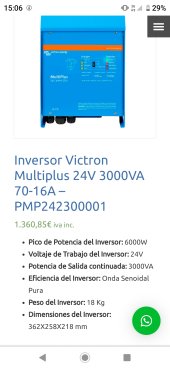Mountainmama
New Member
- Joined
- Oct 27, 2021
- Messages
- 14
Good morning from a mountain in sunny Spain
I currently have a small system of 2 x 85w panels and 200ah batteries 12v. And a broken Trace inverter. I use 12v lights and a generator for 220v.
Some neighbours have recently upgraded their large system and are giving (!!!) me their 2v x 12 battery bank and a 5kw inverter system (comprising of 2 inverters, a slave and a master)
So here come the rookie questions,
My system is 12v and I want to remain 12v because of the 12v lighting already in place in my house which I love.
1...Will I be able to configure the batteries I'm being given in 2 groups of 6 to give 12v?
2...Their system is 24v, will I be able to use the inverter(s)? and still keep my 12v lights?
Thanks for reading, any pointers gratefully received whilst I get my head round this exciting possibility ?
I currently have a small system of 2 x 85w panels and 200ah batteries 12v. And a broken Trace inverter. I use 12v lights and a generator for 220v.
Some neighbours have recently upgraded their large system and are giving (!!!) me their 2v x 12 battery bank and a 5kw inverter system (comprising of 2 inverters, a slave and a master)
So here come the rookie questions,
My system is 12v and I want to remain 12v because of the 12v lighting already in place in my house which I love.
1...Will I be able to configure the batteries I'm being given in 2 groups of 6 to give 12v?
2...Their system is 24v, will I be able to use the inverter(s)? and still keep my 12v lights?
Thanks for reading, any pointers gratefully received whilst I get my head round this exciting possibility ?



